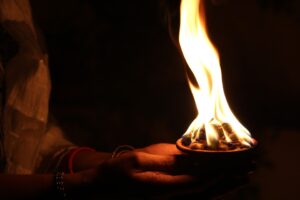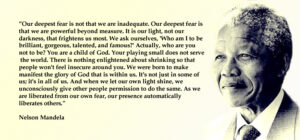Post By: Vishwanath Iyer Published on: December 4, 2016 Reading time: 5 minutes
 Sva means “self’ or “belonging to me”, adhyāyam means “inquiry” or “examination”. Also, svādhyāyam literally means, “to get close to something.” Additionally, in this context, it means to study oneself through meditation or contemplation (mimāmsa).
Sva means “self’ or “belonging to me”, adhyāyam means “inquiry” or “examination”. Also, svādhyāyam literally means, “to get close to something.” Additionally, in this context, it means to study oneself through meditation or contemplation (mimāmsa).
Importantly, contemplation or reflection increases awareness (prajñā) at two levels – a gross component (sthūla) and a subtle component (sūkṣma). So, when we review any situation, our understanding and cognition of both components evolve. This is called reflection (mimāmsa) which is an element of introspection (svādhyāyam).
For example: the world we see around us is made of the primordial elements (panchabhūtas) such as earth (prithvi), water (áp), fire (agni), air (vāyu), space (ākāṣa).
For example – The internal combustion engine is driven on the principle of “Ideal gas law” that when the temperature of a gas is increased, pressure increases and this makes the gas expand.
For instance, when you read this sentence, the primary information you see is derived through its physical attributes (sthūla-śarīra). Next, you cognise the alphabets and words that are transmitted through a device. However, your experience of the underlying principles (sūkṣma-śarīra) comes from the quality of your awareness as you decipher the information (mano-maya-koṣa) relating to the subject (vijñāna-maya-koṣa).

(Wikipedia extract) Nelson Mandela was born into a Thembu royal family. His early life was dominated by traditional Thembu custom and taboo. Growing up, Mandela attended church services every Sunday with his guardians and Christianity became a significant part of his life. However, he never really gave up his Thembu heritage.
In college, he was a supporter of the British but was rusticated for protesting against the management. Running away from an arranged marriage, he moved to Johannesburg where he pursued a career in law where he found himself attracted to communism. He got involved in South African politics and became part of ANC, becoming a founding member of ANC- Youth League. Also, he participated in the anti-apartheid Defiance Campaign.
Initially a peaceful protester, organizer and leader, he worked to unite all non-whites into a cohesive opposition. Finally, concluding that peaceful solution was not achievable, he began to advocate violent opposition to apartheid. As a result, he was imprisoned for 25 years, where he was subjected to privation and torture. Mandela studied Islam in prison. Lastly, when he was released, now having worldwide acclaim and recognition, he transformed to a moderate politician advocating unity and reconciliation.
Internal Tags: Karma, Dharma (conditioning), Stress and Situational Awareness, Stress and prana, Awareness measures, Bhakti Yoga fundamentals, Jnana Yoga, Karma Yoga, Hatha Yoga and Raja Yoga.
External Tags: Consciousness